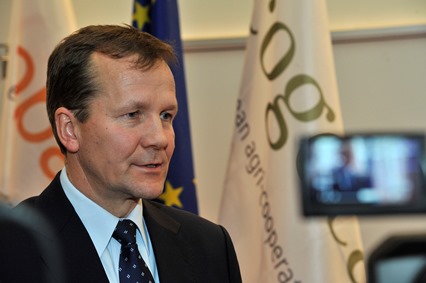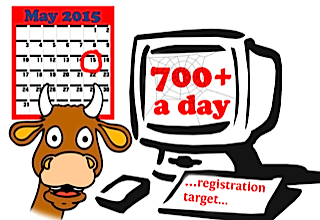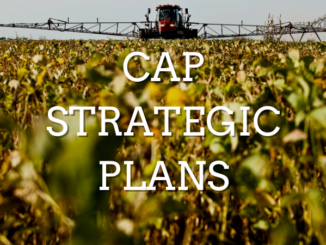
Copa-Cogeca is attempting to derail the European Commission’s Farm to Fork strategy. In a letter seen by ARC2020, dated April 2nd, the agri lobby have called for an “inception impact assessment” to be carried out, due to unique circumstances caused by Covid19.
This type of assessment would replace the already delayed Farm to Fork roadmap, and essentially quagmire Farm to Fork for months or perhaps years of detailed studies, consultations and considerations.
The letter, sent to Norbert Lins, chair of the Agriculture and Rural Affairs Committee in the European Parliament, as well as to the political groups in COMAGRI, the Chair of the Committee on Environment, Public Health and Food Safety and members of these two committees, states:
“as this initiative will have significant economic, social and environmental impacts, it is imperative that the Commission carry out an inception impact assessment, not only for the farm to fork strategy, but for the entire European Green Deal before taking any political or regulatory decision. This is even more relevant when it comes to the setting of targets such as those to reduce the use of pesticides, fertilizers or antibiotics”.
-
The initial description of the problem and its underlying drivers.
-
Any issues related to subsidiarity.
-
Why EU action is needed and its value added.
-
The policy objectives and options.
-
The likely economic, social, and environmental impacts of each policy options.
-
The main features of the stakeholder consultation strategy.
Elsewhere, the letter, signed by COPA President Pekka Pesonen, states that the organisation, which represents 22 million farmers, “would like to support the postponement of the presentation and adoption of the Communication on the farm to Fork Strategy that the Commission is considering for later this month”.
The Covid19/Coronavirus situation means farmers are facing “an increasingly difficult situation”, where “rapid and negative knock-on effects” are impacting the sector in the “immediate, and the medium to long term”
The Covid19/Coronavirus situation means farmers are facing “an increasingly difficult situation”, where “rapid and negative knock-on effects” are impacting the sector in the “immediate, and the medium to long term”
Copa is doubling down on the need to maintain the current food provisioning system, claiming that the targets in Farm to Fork, for reduced fertilizer, pesticide and antibiotic use, “are likely to have far-reaching consequences for the volumes of food being produced in the EU and therefore the Union’s food security”.
The organisation is however “supportive of reaching a rapid decision on the ongoing legislative processes on the CAP post 2020 and the transition regulation” the letter states.
On 27th March, the European People’s Party (EPP) in the Parliament, of which Norbert Lins is a member, “called for another postponement of the planned Farm to Fork Strategy (F2F) until at least after the summer, citing the “crisis caused by the coronavirus pandemic””‘ Euractiv reported.
The news agency quoted Célia Nyssens, policy officer for agriculture at the European Environmental Bureau (EEB), who stated that there is a need “to start planning for the future to build more resilient and sustainable food supply chains – exactly what the Farm to Fork Strategy is about” while emphasizing that the Farm to Fork will take time, and will not impose restrictions immediately.
As ARC2020 reported last week, it is likely that the Farm to Fork would adjust CAP incrementally, year on year, until 2027, rather than result in an abrupt adjustment.
It is also the case the the EU leaders reaffirmed the importance of the Green Deal in a letter from March 26th, which reaffirmed, in a COVID19 context that,
“We should however start to prepare the measures necessary to get back to a normal functioning of our societies and economies and to sustainable growth, integrating inter alia the green transition and the digital transformation, and drawing all lessons from the crisis. This will require a coordinated exit strategy, a comprehensive recovery plan and unprecedented investment.”
Already angered by the EPP’s call for further delay, this new move by Cope Cogeca will infuriate the various NGOs campaigning on consumer, health, nature, climate, animal welfare, organic and other farming approaches, such as those in the Good Food Good Farming and Food Policy coalitions.
This, coupled with questionable amendments being added to the CAP transitionary plans, and a lack of momentum in the Environmental Committee of the European Parliament, adds to the barriers facing those striding for significant agri-food policy change.
More on Covid19
Framing Farming – Nationalism, Food Security and Food Sovereignty
UK | Coronavirus: Rationing Based on Health, Equity and Decency now Needed
Coping with Covid19 – Commoning as a Pandemic Survival Strategy
Council of Ag Ministers meet on Covid19 | Green Lines, State Aid, CAP Extension
Coping with Covid19 – Tensions in Farming, Trade and the EU Institutions
Coping with Covid19 – the Open Food Network and the New Digital Order(s)
More on Farm to Fork
Poking Holes in Farm to Fork: Health Groups Take The Strategy’s Temperature
Poking Holes in Farm to Fork: Environmental Groups Seek a Coherent Vision
Awkward Alignment – How will Green Deal Momentum and the CAP Process Work Together?






7 Trackbacks / Pingbacks
Comments are closed.